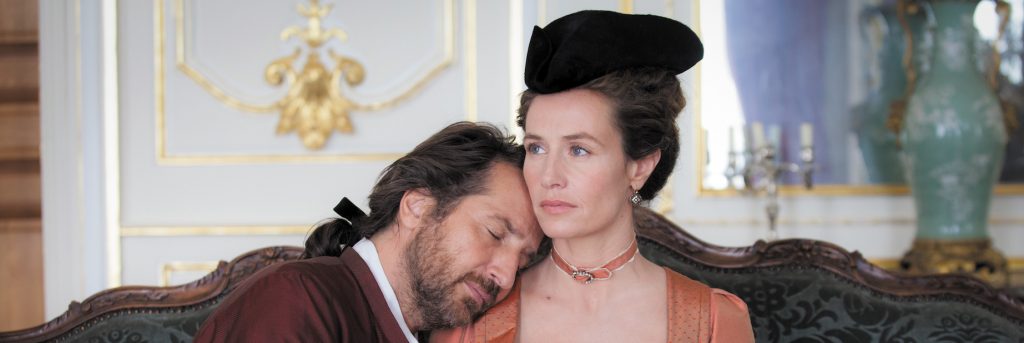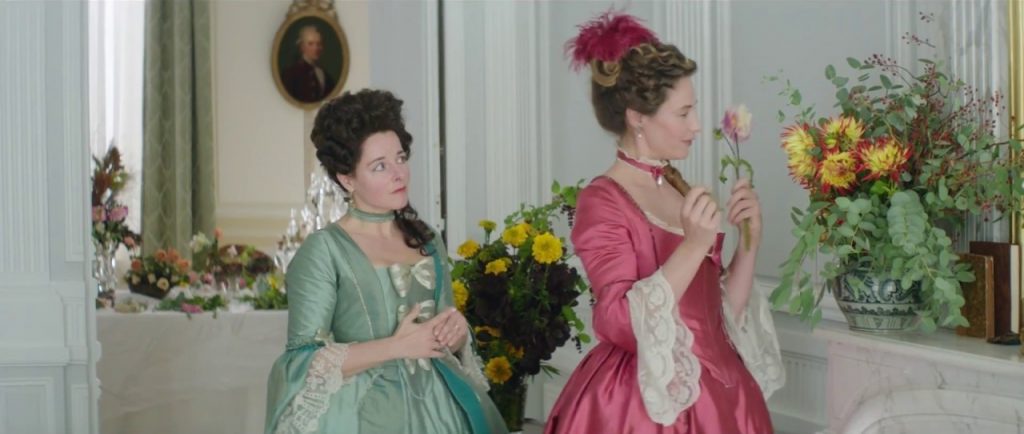Elena Russo
Johns Hopkins University
A prolific author of the kind of romantic comedies that respectable American critics have called “mouth-watering Gallic soufflé,” French actor-director Emmanuel Mouret has been said to be the love child of Woody Allen and Eric Rohmer.[1] Like Allen (thankfully much younger and with the winning looks of a lost puppy), Mouret plays the neurotic, bumbling, leading man who always gets the girl in the end. Like Rohmer’s, his characters fuss over their labyrinthine emotions in long, fully-formed sentences about, say, the lingering effects of a kiss: “We have lost our sharpness of judgment. That is the reason why our recollection is altered. It’s no longer even a memory: it’s an illusion.”[2] Charming, naïve, awkward self-deception of the kind that makes the audience cringe and laugh at same time is the hallmark of Mouret’s style in his romantic comedies. Like Rohmer (and like Marivaux, to whom Rohmer has often been compared) Mouret mines the small but rich terrain of the “surprise of love,” in which characters are fooled by their own emotions and reveal a great deal about themselves without realizing it. He adds to the mix a touch of emotional slapstick, for his romancing heroes and heroines may bring to mind the peekaboo games of Harpo’s and Groucho’s mirror gag.
That he would situate his new film, Mademoiselle de Joncquières (2018) in the eighteenth century – which, as we know, was when they invented intellectual sexy talk, right? – should not therefore come as a surprise. Yet, this is not a romantic comedy, and indeed, Mouret does not feature in the main role, which is held by Édouard Baer. If anything, it would be a comédie héroique, in the vein of Marivaux’s The Triumph of Love (adapted for the screen in 2001 by Clara Peoploe, with Mira Sorvino and Ben Kingsley), for scheming, travesty and deceit are serious affairs, and we cheer for the marriage that crowns the intrigue as much as we sympathize with those who have been left behind. The story comes from Diderot’s novel Jacques the Fatalist and has been famously and superbly adapted by Robert Bresson in Les Dames du Bois de Boulogne (1944).
The opening scenes of Mademoiselle de Joncquières show the marquise de la Pommeraye being wooed by the marquis des Arcis in the wooded alleyways of her country estate. A young, attractive widow, the marquise would rather be alone than be seduced and discarded by someone like the marquis, who is a good friend but a notoriously fickle lover. But the amiable, disheveled suitor (who sports a permanent five-day stubble and an unbuttoned collar as markers of his good nature) promises that this time it’s going to be different. Their happiness however lasts barely two years, which, to be honest, feels like a very long time, considering that all they do is walk in the park, stroll from room to room, read while standing up, read while lying down, and exchange amorous glances. (In Diderot’s novel, Mme de la Pommeraye led an active social life in her château, with guests, conversation and gambling, but when modern audiences picture the ancien regime’s idle rich, they picture them as doing absolutely nothing). In a key moment, the marquise, who senses her lover’s boredom, draws him out by falsely confessing that she has fallen out of love. Sure enough, the delighted marquis seizes the opportunity: “Me too!” The two promise to remain friends, but the deeply grieving marquise hides her wounds and hatches a revenge. She will lure the marquis into falling in love with a woman who seems so chaste and pious that if he wants her he’ll have to marry her. The woman is in reality a prostitute who has been plying her trade with her mother, a disgraced and impoverished noblewoman living under an assumed name.
stroll from room to room, read while standing up, read while lying down, and exchange amorous glances. (In Diderot’s novel, Mme de la Pommeraye led an active social life in her château, with guests, conversation and gambling, but when modern audiences picture the ancien regime’s idle rich, they picture them as doing absolutely nothing). In a key moment, the marquise, who senses her lover’s boredom, draws him out by falsely confessing that she has fallen out of love. Sure enough, the delighted marquis seizes the opportunity: “Me too!” The two promise to remain friends, but the deeply grieving marquise hides her wounds and hatches a revenge. She will lure the marquis into falling in love with a woman who seems so chaste and pious that if he wants her he’ll have to marry her. The woman is in reality a prostitute who has been plying her trade with her mother, a disgraced and impoverished noblewoman living under an assumed name.
 In Les Dames du Bois de Boulogne, with Maria Casarès in the role of Mme de la Pommeraye (Helène) and Elina Labourdette in that of the young prostitute (Agnès), Bresson had transposed the events to modern times, though in “a present that was anything but contemporary,” amidst settings and objects that formed a homogeneous, neutral space meant to be as unobtrusive as possible.[3] It’s of course the opposite in a period piece, where the focus is on reconstructing spaces, colors and textures that play as much an active role as the actors themselves. The reconstruction in Mademoiselle des Jonquières is graceful and exquisite. The château de Sourches, a neo-classical edifice built between 1761 and 1786, its magnificent avenues of lime trees, its bowers, and the historic park of Marly-le-Roi are grandiose spaces that reflected the very public status of the king and of his high court official, the marquis du Bouchet des Sourches, Grand Prévôt de France, whose daughter-in-law, the marquise de Tourzel, accompanied Louis XVI on his flight to Varennes and later witnessed the lynching of the princesse de Lamballe in the prison of La Force. But in this movie society is all but absent, and the castle and its grounds are made to look intimate and cozy, with their large blocks of honey-colored pierre de taille caressed by the soft green hues of late spring. The interiors are unequivocally divided into “his” and “hers:” white walls, fine moldings and pastel upholstery drenched in daylight for her château; richly-carved oak paneling aglow in the light of chandeliers, red tapestry and massive fireplaces for his large townhouse. Even the brothel, in which Mlle de Joncquières and her mother have been reluctantly earning their living, looks pastoral, with the same pierres de taille sunk in greenery, wholesome-looking women hanging the laundry and performing chores, and maybe bringing a pot of fresh milk to the working girls after a long night’s work. It looks more like a farming commune than a den of sin, and one suspects that if the marquise ever ventured in her château’s backyard, she would run into it, for it looks very much like the servants’ quarters, its côté cuisine.
In Les Dames du Bois de Boulogne, with Maria Casarès in the role of Mme de la Pommeraye (Helène) and Elina Labourdette in that of the young prostitute (Agnès), Bresson had transposed the events to modern times, though in “a present that was anything but contemporary,” amidst settings and objects that formed a homogeneous, neutral space meant to be as unobtrusive as possible.[3] It’s of course the opposite in a period piece, where the focus is on reconstructing spaces, colors and textures that play as much an active role as the actors themselves. The reconstruction in Mademoiselle des Jonquières is graceful and exquisite. The château de Sourches, a neo-classical edifice built between 1761 and 1786, its magnificent avenues of lime trees, its bowers, and the historic park of Marly-le-Roi are grandiose spaces that reflected the very public status of the king and of his high court official, the marquis du Bouchet des Sourches, Grand Prévôt de France, whose daughter-in-law, the marquise de Tourzel, accompanied Louis XVI on his flight to Varennes and later witnessed the lynching of the princesse de Lamballe in the prison of La Force. But in this movie society is all but absent, and the castle and its grounds are made to look intimate and cozy, with their large blocks of honey-colored pierre de taille caressed by the soft green hues of late spring. The interiors are unequivocally divided into “his” and “hers:” white walls, fine moldings and pastel upholstery drenched in daylight for her château; richly-carved oak paneling aglow in the light of chandeliers, red tapestry and massive fireplaces for his large townhouse. Even the brothel, in which Mlle de Joncquières and her mother have been reluctantly earning their living, looks pastoral, with the same pierres de taille sunk in greenery, wholesome-looking women hanging the laundry and performing chores, and maybe bringing a pot of fresh milk to the working girls after a long night’s work. It looks more like a farming commune than a den of sin, and one suspects that if the marquise ever ventured in her château’s backyard, she would run into it, for it looks very much like the servants’ quarters, its côté cuisine.
 In the French presskit interview, Mouret emphasizes the “captivating modernity of this story, and by modernity I mean what never grows old but survives through time.”[4] And yet, this revenge plot hatched by a grieving mind, this story of a humiliation that becomes a blessing, this prostitute chaste at heart being redeemed by love and marrying rich… all that feels as anachronistic in 2018 as it did in 1944. Everything that is truly modern in Diderot is necessarily being stripped from the barebone story: the conversational frame, the background noise generated by countless interruptions, the gendered reception issuing from both the narrator (a woman) and the audience (two men, Jacques and his master), the philosophical themes that run through Diderot’s novel.
In the French presskit interview, Mouret emphasizes the “captivating modernity of this story, and by modernity I mean what never grows old but survives through time.”[4] And yet, this revenge plot hatched by a grieving mind, this story of a humiliation that becomes a blessing, this prostitute chaste at heart being redeemed by love and marrying rich… all that feels as anachronistic in 2018 as it did in 1944. Everything that is truly modern in Diderot is necessarily being stripped from the barebone story: the conversational frame, the background noise generated by countless interruptions, the gendered reception issuing from both the narrator (a woman) and the audience (two men, Jacques and his master), the philosophical themes that run through Diderot’s novel.
For Jacques the Fatalist is not only unstoppable, fascinating blabber, storytelling as the backbone of life, an experiment on the novelistic genre: it is also a meditation on determinism and freedom in human action. Mme de la Pommeraye is both a personification of God and the Storyteller, she who unrolls the Great Scroll. Thanks to her superior knowledge of the male psychology she turns her lover into a puppet, plays him like a fiddle, makes him travel from A to Z and pass through all the letters in between. But then something happens in the end which she had not foreseen: the marquis embraces his fate, decides to be happy and in so doing recovers his freedom. “I don’t regret anything; la Pommeraye believed she was getting back at me, but the truth is that she has done me a great favor.”[5] Freedom has overturned the strictures of psychological determinism.
(click this link:) LES DAMES DU BOIS DE BOULOGNE de Robert BRESSON – Official trailer – 1945

Bresson’s movie admirably portrays the tangled threads of Hélène’s plot and the rips in the fabric. Driven by her sure hand, the plan moves forward; but while Jean, Hélène’s feckless lover (the baby-faced Paul Bernard), is perfectly predictable, Agnès, the young cabaret dancer, is as mercurial and restless in her spirit as she is lithe and supple the first time we see her, tap-dancing and doing backflips in a night-club. Trapped in a hopeless life as a demi-mondaine, Agnès and her mother are enticed by Hélène, who promises them a better life but does not reveal her hand. It’s only slowly and by degrees that Agnès comes to understand what her role is meant to be. Hélène is like a volcano burning under a cap of snow, but Agnès is the most dynamic character in the movie. We see her passing from hopelessness and self-loathing to surprise, skepticism, hope, suspicion and a terrible realization. By then it’s too late, for we are made to understand that she is being trapped by her burgeoning feelings for Jean. At each step of the way, Agnès resists the role that’s being imposed on her; at each pivotal moment we are made to feel that the plot may go one way or the other. Because Agnès remains a wild card, the plot never feels overdetermined to the viewer.
Mouret chooses another method. “Bresson foregrounds [Agnès-Joncquières] early on, whereas Diderot keeps her in the background till the end.” The latter approach, Mouret says, is more dramatic: “She blossoms suddenly and shows a depth that puts the whole story in a new light. I wanted to preserve the emotion and the originality of this dramatic surprise.”[6] But his Joncquières appears static and frozen. Her heavy-lidded reddened eyes, the sorrowful, penitential frown she wears throughout are meant to signal unequivocally that she is unhappy, and they need only a minor adjustment to turn, at the movies’ climax, into a pleading furrow.
 In waiting for so long to reveal her thoughts, Diderot and Mouret increase the dramatic expectation. But they also create a problem: how can they make her sudden transformation from submissive co-conspirator to repentant, sincere wife, emotionally persuasive? Even more crucial: how can they make the marquis’ swift forgiveness of her, his rapid recovery of self-mastery, persuasive? I won’t linger on how Diderot talks his way out of this problem, which fascinates him: indeed, the less his Mlle de Joncquières says about herself, the more Jacques and his master are driven to talk about her and fill the gaps: for Jacques the Fatalist is really a story about interpreting stories. [7] The interesting thing is that both Bresson and Mouret, in different ways, have taken Jacques and his master’s critique to heart, and have developed this character along the lines that Diderot indicated: if only for that it would be worthwhile watching these movies when rereading of the novel.
In waiting for so long to reveal her thoughts, Diderot and Mouret increase the dramatic expectation. But they also create a problem: how can they make her sudden transformation from submissive co-conspirator to repentant, sincere wife, emotionally persuasive? Even more crucial: how can they make the marquis’ swift forgiveness of her, his rapid recovery of self-mastery, persuasive? I won’t linger on how Diderot talks his way out of this problem, which fascinates him: indeed, the less his Mlle de Joncquières says about herself, the more Jacques and his master are driven to talk about her and fill the gaps: for Jacques the Fatalist is really a story about interpreting stories. [7] The interesting thing is that both Bresson and Mouret, in different ways, have taken Jacques and his master’s critique to heart, and have developed this character along the lines that Diderot indicated: if only for that it would be worthwhile watching these movies when rereading of the novel.
 A movie however can’t waste much time in digressions and talk, the crisis (or should we call it the marquis’ conversion?) must happen quickly. Life-threatening illness has the advantage of compressing time, purifying the sinner, and disarming the aggrieved man. Diderot’s heroine faints repeatedly, her life is in danger. So does Bresson’s Agnès: her dramatic speech is delivered as she lies down, in a dreamlike state, her eyes closed, while Jean calls her back from the dead, as Orpheus calls Eurydice.[8] And Mouret’s Mlle de Joncquières? The doleful young woman goes to drown herself in the Seine, only to be rescued miraculously by some rough-looking types and laid down half-dead on the pavement of the cour d’honneur of the marquis’ hôtel particulier.
A movie however can’t waste much time in digressions and talk, the crisis (or should we call it the marquis’ conversion?) must happen quickly. Life-threatening illness has the advantage of compressing time, purifying the sinner, and disarming the aggrieved man. Diderot’s heroine faints repeatedly, her life is in danger. So does Bresson’s Agnès: her dramatic speech is delivered as she lies down, in a dreamlike state, her eyes closed, while Jean calls her back from the dead, as Orpheus calls Eurydice.[8] And Mouret’s Mlle de Joncquières? The doleful young woman goes to drown herself in the Seine, only to be rescued miraculously by some rough-looking types and laid down half-dead on the pavement of the cour d’honneur of the marquis’ hôtel particulier.
Mouret hews closely to Diderot’s climactic moment, both in words and body language, but the alterations he makes are significant of what he takes to be modern. At the core of Diderot’s dramatic moment, the penitent woman drags herself on her knees to the room where her husband has ordered her to meet him, and refuses get up before she is done telling him what she wants him to hear. He listens to her and then takes her in his arms and raises her to him, in a gesture that raises both her body from the floor and her spirit from her self-imposed, penitential degradation. The names he gives her are symbolic of her absolution and her new identity: “Get up, I beg you; my wife, get up and give me a kiss; madame la marquise, get up, that is not your place; madame des Arcis, get up…” (183). The sacred character of this body language (pilgrims to Christian shrines would climb the steps of the church on their knees, and the kiss the marquis asks from his wife is not unlike the kiss bishops gave to the newly ordained) would not have been lost on Diderot’s audience. Of course it feels different today. In the movie, the young woman delivers her speech standing up, but Mouret can’t let go of such a powerfully charged gesture, so he has her fall to her knees unexpectedly (out of emotion? exhaustion?), facing not her husband (too demeaning?) but the fireplace mantel. Then the marquis picks her up and puts his arms around her. “I have forgiven you,” he tells her “but I see you don’t believe me.” In the movie these words sound a little ill-timed, for at this point nothing is suggesting that the young marquise feels unworthy of his forgiveness. That’s because the screenplay has omitted a couple of crucial lines. In Diderot’s text, the marquise falls back to her knees and kisses her husband’s feet. He then tells her: “I have forgiven you; I told you so; but I see you don’t believe me.” And she replies: “It must be so; and yet I must never believe it.” And that’s when the marquis cries out in triumph: “… la Pommeraye has done me a great favor.”
 That’s not the kind of power trip that Mouret wishes his Diderot to convey. His marquis des Arcis is an open-minded, (if a little too trusting, and yes, he likes women a bit too much, but without malice) free-thinker, well ahead of his time (a bit like Mouret imagines Diderot to have been). When he finally decides to marry the false young dévote, he asks the marquise to give the news to the two women. “Let them know what my intentions are,” Diderot’s marquis had said. That becomes: “Let me know what their intentions are,” which sounds more polite, but given the situation hardly makes any sense.
That’s not the kind of power trip that Mouret wishes his Diderot to convey. His marquis des Arcis is an open-minded, (if a little too trusting, and yes, he likes women a bit too much, but without malice) free-thinker, well ahead of his time (a bit like Mouret imagines Diderot to have been). When he finally decides to marry the false young dévote, he asks the marquise to give the news to the two women. “Let them know what my intentions are,” Diderot’s marquis had said. That becomes: “Let me know what their intentions are,” which sounds more polite, but given the situation hardly makes any sense.
The marquis is such a nice man that he is willing to meet his repentant wife more than halfway. The exculpatory lines that Diderot gave to his heroine are passed on verbatim to him in the movie. “I have been driven, out of weakness and under the influence of authority to a shameful action; but do not think, Monsieur, that I am a bad person” becomes: “I do not believe you are a bad person. You have been driven, out of weakness and under the influence of authority, to a shameful action. Isn’t it true that you have been forced to lie to me and consent to this union?” “Yes, Monsieur,” she replies. Cue to transition to the issue of consent (almost a #MeToo moment!): the marquis is against forced marriages, he wants her to know that she is free to go wherever she pleases; he’ll take care of her needs and she may keep his name. “I want you to be free,” he tells her. “I’ll be free when you’ll be able to read into my heart and see how much I hate lies,” she pleads. No such concern about his wife’s freedom of choice ever troubled Diderot’s marquis. As for her, she was less sanguine than Joncquières about the possibility of a meeting of souls: “Ah! if only you could read into my heart and see how distant from me my past sins are!” Diderot’s heroine had cried out.
 While the marquis is being so thoroughly simpatico, Mme de la Pommeraye is being portrayed like the Saint-Just of the cause of women. With her it’s not personal: she just wants to give the marquis a good lesson and make the world a better place for women! “If no righteous soul ever undertook to correct men, how could we ever hope for a better world?”
While the marquis is being so thoroughly simpatico, Mme de la Pommeraye is being portrayed like the Saint-Just of the cause of women. With her it’s not personal: she just wants to give the marquis a good lesson and make the world a better place for women! “If no righteous soul ever undertook to correct men, how could we ever hope for a better world?”
“I was born to avenge my sex and dominate yours,” says Laclos’s Mme de Merteuil, another smart marquise completely immune to sisterhood solidarity. To be sure, there is no shortage of fanatics, including female fanatics, in Diderot’s fiction (as for instance Mme de La Carlière in This is not a Story), but neither Merteuil nor Diderot’s Pommeraye could ever share the obtuse self-righteousness shown by Cécile de France’s marquise. By the same token, her cruelty to the two women far exceeds that shown by her predecessors. Confronted by Joncquières’s distraught mother, who asks her, a broken bottle raised to the marquise’s throat, why she has destroyed her daughter’s honor, the marquise’s answer makes the mother recoil in disbelief: “Has it not been an honor for you to be my accomplices? You, who in the past have been betrayed by a man, be proud to have had a share in this operation. Think that if every woman acted like us, the honor of being one would be greater.”
Perhaps our modern sense of fairness refuses to take ill will for what it is. We would never moan and bewail, as Jacques does, while learning about the inexorable progress of the marquise’s plot: “What a woman! What a devil of a woman! […] The bitch! The raging bitch! The scoundrel!”[9] We want to understand and explain what people’s reasons are when they do something bad. When we do something bad we tell ourselves it’s for a good reason. That’s what the marquise does. And that’s what Mouret does to the marquise. Bresson didn’t do it to Hélène. Instead, he gave us the gift of Casarès pale, narrow face, where her secret flame burned undisturbed.
ill will for what it is. We would never moan and bewail, as Jacques does, while learning about the inexorable progress of the marquise’s plot: “What a woman! What a devil of a woman! […] The bitch! The raging bitch! The scoundrel!”[9] We want to understand and explain what people’s reasons are when they do something bad. When we do something bad we tell ourselves it’s for a good reason. That’s what the marquise does. And that’s what Mouret does to the marquise. Bresson didn’t do it to Hélène. Instead, he gave us the gift of Casarès pale, narrow face, where her secret flame burned undisturbed.
Emmanuel Mouret, Mademoiselle de Joncquières/Lady J, 2018, France, Color, 109 min., Moby Dick Films, Arte France, Reborn Production, et al.
NOTES
- See Stephen Holden’s review of Shall We Kiss?, The New York Times, March 27, 2009. In print p. C10 of the New York edition.
- From Shall We Kiss? (Un baiser s’il vous plaît), 2009. All translations are mine.
- Philippe Roger, “Diderot, Cocteau, Bresson, ou ‘L’histoire d’un mariage saugrenu’,” Interpréter Diderot Aujourd’hui (Paris, Le Sycomore, 1984, p. 38).
- http://distrib.pyramidefilms.com/pyramide-distribution-a-l-affiche/mademoiselle-de-joncquieres.html
- Cette Pommeraye, in the original, has a connotation of contempt. All quotations from Jacques le Fataliste come from the French Garnier-Flammarion pocket edition (Paris, 1997) p. 183.
- From the Mademoiselle de Joncquièrescom, French press kit.
- For one entire year […] not one moment of doubt, of remorse. We have seen her fall into step with this horrible plot and do everything she was asked. If Mlle […] were a nice girl, it would have shown,” Jacques and his master protest. Jacques le fataliste, p. 183-4.
- Jean Cocteau wrote the screenplay with Bresson, and it’s tempting to see his touch here.
- Jacques le Fataliste, p. 178 and passim.


